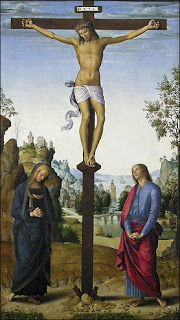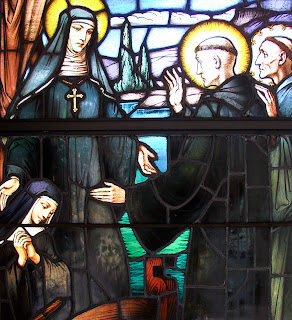St. Scholastica, the twin sister of St. Benedict, is said to have been consecrated to God from her childhood.
She was a nun, and possibly the leader of her community.
In his
Dialogs,
St. Gregory relates the last visit between St. Benedict and St. Scholastica.
It seems that every year they would meet at a house belonging to Benedict’s monastery, not far from the monastery gate.
Benedict would meet her there with a few of his monks, and they would spend the day in the praise of God, in holy conversation and share a meal together.
As the day was coming to a close and Scholastica knew that Benedict would soon leave her to return to his monastery for the night, she beseeched him to stay with her.
St. Gregory relates the event, “When darkness was setting in, they took their meal together and continued their conversation at table until it was quite late.
Then the holy nun said to him, ‘Please do not leave me tonight, brother.
Let us keep on talking about the joys of heaven till morning.’
‘What are you saying, sister?’ he replied.
‘You know I cannot stay away from the monastery.’
“The sky was so clear at the time, there was not a cloud in sight.
At her brother’s refusal Scholastica folded her hands on the table and rested her head upon them in earnest prayer.
When she looked u again, there was a sudden burst of lightning and thunder accompanied by such a downpour that Benedict and his companions were unable to set foot outside the door.
Indeed in this case, Scholasctica’s love triumphed over Benedict’s sense of duty.
Yes, Benedict was indignant and was not at all happy which he clearly expressed to his sister.
Scholastica’s reply, as recorded by Gregory, is priceless:
“When I appealed to you, you would not listen to me.
So I turned to my God and He heard my prayer.
Leave now if you can.
Leave me here and go back to your monastery.”
What he would not do of his own account, he did by the hand of God, and so they spent that last night together talking of the spiritual life.
Three days later, Benedict would see the soul of Scholastica ascend to heaven in the form of a dove. He had her body brought and buried in the tomb that he had prepared for himself.
Her feast day is February 10.
























